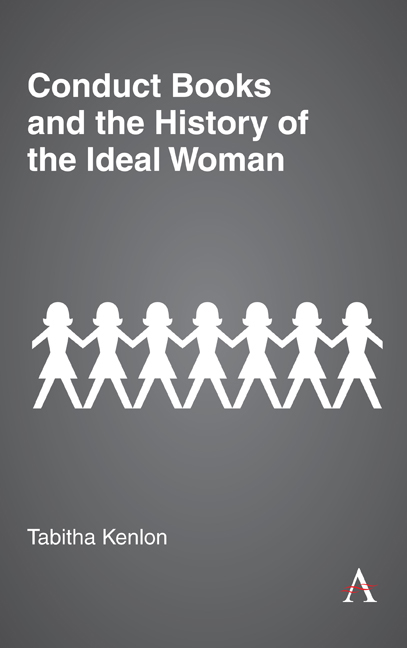Book contents
- Frontmatter
- Contents
- Acknowledgments
- Explanatory Note
- Introduction: Woman as She Should Be
- 1 A Good Woman Is a Godly Woman, Obviously
- 2 Conduct for Those Who Are Not Queen
- 3 Look but Don’t Talk: Reflections of the Ideal
- 4 Playing the Part as Nature Intended
- 5 Victoria’s Angels
- 6 Suffrage, Little Wives and Career Girls
- 7 Feminism Changes Everything, Right? Right??
- Coda: An Ideal End
- References
- Index
4 - Playing the Part as Nature Intended
Published online by Cambridge University Press: 30 April 2020
- Frontmatter
- Contents
- Acknowledgments
- Explanatory Note
- Introduction: Woman as She Should Be
- 1 A Good Woman Is a Godly Woman, Obviously
- 2 Conduct for Those Who Are Not Queen
- 3 Look but Don’t Talk: Reflections of the Ideal
- 4 Playing the Part as Nature Intended
- 5 Victoria’s Angels
- 6 Suffrage, Little Wives and Career Girls
- 7 Feminism Changes Everything, Right? Right??
- Coda: An Ideal End
- References
- Index
Summary
Always Have a Wish List
There's at least one in every family. That relative who can't quite manage to choose the right gift. They send plush toys to teenagers or sports equipment to the quietly studious. Maybe they try books. Now, what would their 15- year- old niece enjoy reading? Not a romance, of course— it’d fill her head with all sorts of nonsense. Classic poetry, perhaps? But it might be too serious for the sweet young thing. Oh, of course! A book of sermons instructing her on the appro¬priate conduct and ideal behavior of a young woman just entering society and contemplating an advantageous marriage! Perfect. What girl wouldn't love that?
Many conduct manuals that now reside in libraries and archives were once the property of young women whose names are sometimes written on the fly¬leaves, often with a date and a note that the volume was a birthday gift. What might the recipient have thought when she was first handed the book? Was she sincerely pleased, considering the advice contained therein as a token of love and concern from the giver? Or did she roll her eyes and tell her sister in a disappointed whisper that she’d much rather have gotten some ribbons for her new hat? Did she read the book carefully? Did she laugh at its precepts? Did she read it at all? These questions might never be answered, but our ability to ask them is notable; such queries indicate that in the two centuries since Geoffrey de La Tour- Landry and Christine de Pizan were writing, more women could read and more families were buying books. The eighteenth century “was the period which discovered the book as a consumer item […] Within this explo¬sion of print culture, women were quickly identified as an important target group.” Publishers showered the public with a wide variety of options, and conduct manuals, generally considered safe reading for impressionable female minds, flourished. While these changes indicate improved conditions for many women, not everyone was content. In a sense, the eighteenth century is bookended by the works of two Marys: Mary Astell's A Serious Proposal to the Ladies, published in 1694, and Mary Wollstonecraft's A Vindication of the Rights of Woman, published in 1792.
- Type
- Chapter
- Information
- Conduct Books and the History of the Ideal Woman , pp. 81 - 104Publisher: Anthem PressPrint publication year: 2020



